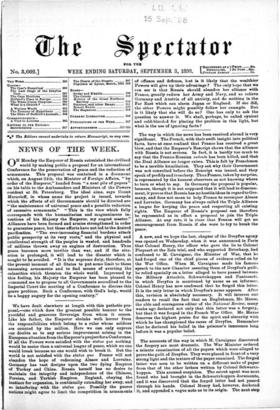The accounts of the way in which M. Cavaignac discovered
the forgery are most dramatic. The War Minister ordered a minute examination of all the papers which were alleged to prove the guilt of Dreyfus. They were placed in front of a very strong light and the texture of the paper examined. The forged letter was seen to be written on a different make of paper from that of the other letters written by Colonel Schwartz- koppen. This aroused suspicion. The secret agent was next found who had brought in the Schwartzkoppen documents, and it was discovered that the forged letter had not passed through his hands. Colonel Henry had, however, docketed it, and appended a vague note as to its origin. The next step was to send for Colonel Henry. He was interrogated by the War Minister himself At first Henry asserted his belief in the authority of the letter, but he shuffled, and showed evident signs of embarrassment. " Come, come," said the Minister, no agent ever gave it to you. You wrote it in pencil to disguise your handwriting the better. You are the forger." The acco..ut in the Daily News proceeds is follows :— " The Colonel's speech grew thick. He denied the charge. It was repeated. He gave fresh explanations, but his tongue grew too thick for his mouth. It was feared he would have an apoplectic stroke." Then came the theatrical moment inevitable in a French incident. " On your honour as a soldier," said Cavaignac, more gently, "did you, or did you not, write that letter ? " " Since you appeal to my soldierly honour, it was I who wrote it." Colonel Henry was than removed to a cell in the fortress of Mont Valerien and that evening cut his throat. But suicide cannot end the tragedy. It is surely now impossible that Dreyfus can be refused justice. That is all his friends ask for. They do not demand his liberation, but merely a new trial. It cannot be true, as alleged by the Soir, that M. Cavaignac, like Valentinian in Beaumont and Fletcher's play, means still to answer, `Justice shall never hear you; I am justice.'



































 Previous page
Previous page